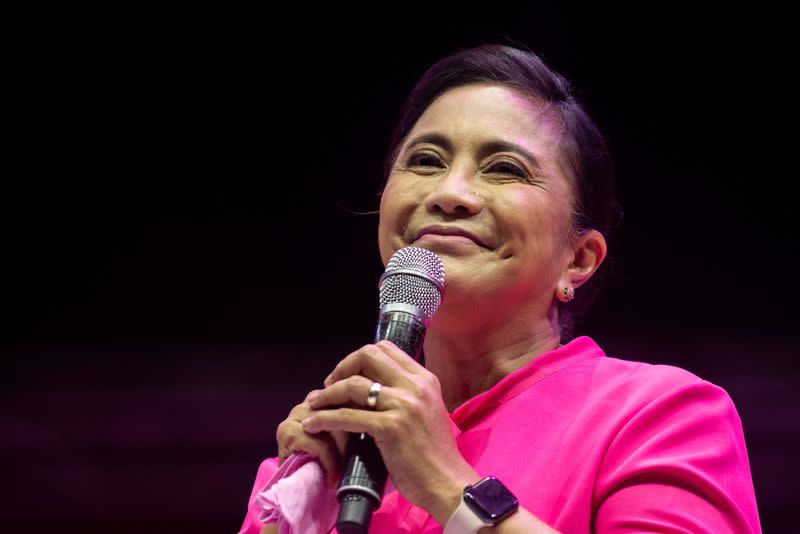Explainer-What's at stake in the Philippines election?
By Martin Petty
(Reuters) - The Philippines holds an election on Monday for a new president, pitting incumbent Vice President Leni Robredo against Ferdinand Marcos Jr, the son of a notorious dictator whose 20-year rule ended in a 1986 uprising.
Here are some of the issues at play:
HOW WOULD EACH CANDIDATE RULE?
Marcos is unlikely to rule like his authoritarian father, although strongman-style leadership could be expected.
This approach proved popular under incumbent Rodrigo Duterte, who cultivated an image as a ruthless, no-nonsense leader who got things done.
If elected, Marcos would probably use his family's influence to consolidate power through transfers, appointments and connections in the bureaucracy, judiciary and other key bodies, replacing potential obstacles with members of his extensive political network.
He could expect a more favourable congress and senate than Robredo.
A Robredo victory would bring a more liberal approach and focus on education, healthcare, poverty and gender equality, while strengthening institutions and oversight and boosting market competition.
She has pledged to improve social welfare, such as unemployment benefits and family support.
However, a Robredo presidency would probably run into turbulence. She has already been a prime target for hate and disinformation campaigns as a vice president who dared to challenge Duterte.
WHAT ABOUT THE ECONOMY?
Neither candidate will advocate a significant economic restructuring, though both have promised to prioritise pandemic recovery and could target investment reforms, such as cutting red tape.
Robredo has pledged to increase investment to tackle climate change, level the playing field for business and promote public-private partnerships.
Marcos has revealed very little about policy and has steered clear of presidential debates and tricky media interviews, focusing on a simple but ambiguous message of unity. Continuity with Duterte is expected, for example on key infrastructure projects.
Some economic risk consultants have seen a higher chance of corruption and nepotism under a Marcos presidency, however, and the scope for score-settling and retaliation against businesses linked to the family's opponents.
WHAT WOULD FOREIGN POLICY LOOK LIKE?
The Philippines' longstanding ties to former colonial power the United States are unlikely to be threatened by either candidate, having been steady through Duterte's years of very public hostility towards Washington.
The defence alliance is crucial for internal security and military capability, and preserving it is vital for a Philippine president's relationship with the armed forces.
Marcos is seen as the candidate closer to China and could benefit from its business interests. He favours a two-way approach that better suits Beijing but will frustrate advocates of the multilateral approach Robredo is likely to pursue.
Marcos has been pragmatic in recognising the Philippines is no match militarily, so a tough stance should not be expected. Robredo would oppose Chinese provocations, and remind Beijing that an international arbitral court ruling in 2016 invalidated most of its South China Sea claims.
WHAT HAS BEEN DUTERTE'S ROLE?
Duterte has had a testy relationship with Robredo but has been characteristically mercurial over Marcos, having both praised him and questioned his suitability to lead.
Duterte has not endorsed Marcos, or any other candidate, but crucially he has not sought to move against him or hurt his reputation.
A big win for Marcos was securing the president's daughter, Sara Duterte-Carpio, as his vice presidential running mate, helping him to absorb some of the incumbent's cult-like following, particularly on social media, and draw new voters.
The dynamic of the two families has spurred speculation of a quid pro quo that helped secure the presidency for Duterte, who in turn smoothed the way for Marcos.
Notable was Duterte publicly thanking politician and Marcos Jr's sister, Imee, for funding his campaign - which she later dismissed as a joke. He also occasionally praised the late dictator and controversially allowed his body to be moved to a "heroes" cemetery in Manila, after years of failed attempts by the family.
HOW IMPORTANT IS SUCCESSION FOR DUTERTE?
Political vendettas are common in the Philippines and former presidents often face legal action or are even jailed. Duterte has made a few enemies.
Though they left no dent on his popularity, Duterte's presidency was fraught with scandals involving allies or appointees, some of which could re-emerge later.
Activists and lawyer groups blame Duterte for thousands of alleged executions of drug pushers and users during his war on drugs and could launch legal action when he leaves office, or lobby the International Criminal Court to resume investigation.
Robredo has been a staunch critic of the president's lethal methods of fighting drugs and crime and would be more likely to enable investigations into Duterte. But with his daughter as vice president and Marcos in charge, he would be well insulated.
(Editing by Clarence Fernandez)




